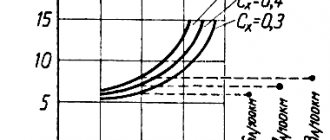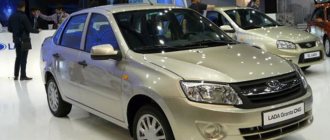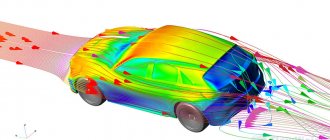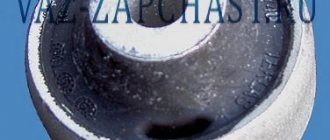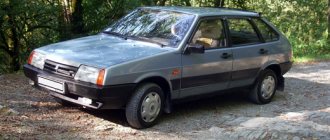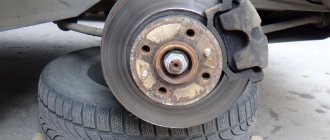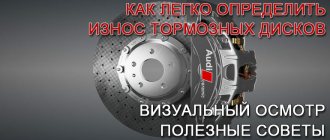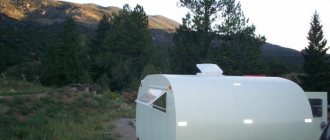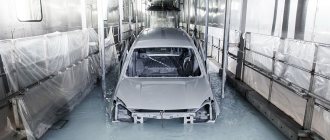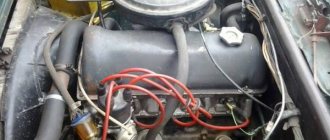Torsional rigidity of the body or LC/c is a value that characterizes the strength characteristics of the automobile frame, its durability and safety. This value has a strong influence on the car’s handling. That is why the world's famous supercars, equipped with carbon fiber and soft lightweight body panels, are distinguished by the highest values of this very parameter. Let's look at the LCD performance of well-known domestic models and compare them with the performance of foreign cars.
Which Lada models have a galvanized body?
It is unknown what percentage of parts are galvanized. Various figures periodically appear in the media, but they are not officially confirmed. The degree of galvanization of Lada cars from the media (list):
- VAZ 2110 - 30%;
- Lada 4×4 (Niva 2121 and 2131) - cataphoretic priming, no galvanized steel.
- Lada Kalina 1 - 52%;
- Lada Kalina 2 - everything is galvanized except the front and rear side members, roof and hood;
- Lada Priora - since August 2008, the body has been galvanized by 29%, and after 2009 by 100% (video);
- Lada Largus - photos of galvanized parts were posted by tourists who visited AvtoVAZ as part of excursions;
- Lada Vesta - for the first time, the outer layer of the body was galvanized (the roof of the sedan is not galvanized, the station wagon is completely galvanized), and the sills and bottom have anti-gravel protection;
- XRAY - only the roof of the external panels is not galvanized, but this is normal practice for the global automotive industry. When testing the corrosion resistance of the body, the XRAY roof passed the test better than the Vesta roof.
Information from the official website:
- Lada Granta sedan: 32% of the weight of body parts is made of galvanized steel. Moreover, 75% of galvanized metal is hot-dip galvanized steel with 2-sided coating. Strong and durable anti-gravel coating on the bottom. Hidden body cavities are treated with anticorrosive. The muffler is made of stainless steel.
- LADA Granta liftback uses galvanized steel (bottom, mudguards, sides), high-strength steel (power frame of the body). Polyester primer with increased chip resistance, black bumper skirt edging
- Lada XRAY: double-sided galvanization of external body panels. Anticorrosive underbody and hidden body cavities.
According to other data:
- Until 1999, AvtoVAZ did not have galvanized bodies; only a regular anti-corrosion layer was applied;
- from 1999 to 2009, cold galvanizing began to be used (application of a zinc-containing coating), but only part of the joints (welding points, fastenings, stampings and other small parts) were processed;
- Since 2009, cold galvanizing began to extend to a wider list of parts (all joints and the most vulnerable parts of the body, sills, bottom, bottom of doors, etc.
How to use a thickness gauge correctly?
When purchasing a car on the secondary market, it is not enough to know how the purchase and sale transaction and vehicle registration take place. The practice of measuring the thickness of the paintwork on the car body and a table of the factory parameters of the factory coating will also not hurt. To do this, experts offer several recommendations with which you can effectively use a thickness gauge:
- Buy your device wisely. An inexpensive unit has a narrow specialization; it is able to determine whether the car has been puttied, but an additional ball of paint is unlikely. To work with aluminum parts, you will have to buy a more expensive device, and for plastic elements, the price of the device will be comparable to the cost of some used cars. Therefore, buy a thickness gauge according to the situation.
- Some car companies offer to rent a device - it will be cheaper, especially when you plan to only buy a car on the secondary market.
- After purchase, be sure to calibrate the unit. For this purpose, reference samples made of steel and plastic are used, on which there is a layer of paint. It is enough to compare the measurement results with the data printed on the plates. If the numbers do not match, you need to adjust the device settings and achieve identical readings.
- It is worth adjusting the mechanism for each measurement separately. Many models have an adjustment function, do not neglect it, because it reduces the likelihood of errors.
What to look for
Every year, technologies are improved, and the guarantee for body protection against rust increases, and AvtoVAZ is no exception (the thickness of Vesta’s paintwork is at the level of its competitors, 100-150 microns). Pay more attention to the presence of this guarantee than to dubious information about body galvanization from the media and advertising.
At the moment, AvtoVAZ provides a 6-year . Depending on the operating conditions of the vehicle and the quality of the body treatment with anti-corrosion agents, its service life can vary greatly (see survey). If rust appears during the warranty period, do not hesitate to contact your dealer.
How do you evaluate the anti-corrosion treatment of Lada car bodies? Is it necessary to additionally treat weak points or is the factory version sufficient? Let us remind you that you can get acquainted in more detail with modern AvtoVAZ cars by content in the context of models (Vesta, Granta, Priora, Kalina, Largus, Niva 4x4 and XRAY). The VK survey is being conducted among Vesta owners.
Torsional rigidity of the body or LC/c is a value that characterizes the strength characteristics of the automobile frame, its durability and safety. This value has a strong influence on the car’s handling. That is why the world's famous supercars, equipped with carbon fiber and soft lightweight body panels, are distinguished by the highest values of this very parameter. Let's look at the LCD performance of well-known domestic models and compare them with the performance of foreign cars.
How and how the thickness of paintwork is determined by car brands: physics of the process
As a rule, all models have approximately the same layer of factory coating - 100-140 microns. When a body element is straightened, a certain amount of putty will certainly appear under the paint, which moves the characteristics of the coating away from factory standards. Usually in this case the formation value will be at least 200 microns, and in some cases even more.
Thickness gauges can detect such deviations. The studied thickness of paintwork on cars and a table of standard coating parameters will immediately clarify the situation. Inexpensive models of measuring instruments make it possible to determine the presence of putty, but not repainting. High-end thickness gauges can check the coating layer on aluminum and plastic parts, but they are quite expensive.
The principle of any coating layer meter is to determine the interval from the sensor to the base of the body element. The simplest option is when the part is made of steel, here you can limit yourself to a basic magnetic device costing up to 1000 rubles.
Its design is simple: a permanent magnet is mechanically connected to the pointer. The closer it is to the metal, the stronger the attraction and the arrow deviates at a larger angle. The disadvantages are low sensitivity and accuracy, but the device confidently indicates putty from a millimeter.
Classification of thickness gauges
Specialized stores offer several types of such devices. It goes without saying that the principle of their operation, cost and capabilities are different. Therefore, it makes sense to consider each type separately:
- Ultrasonic – work both with metal materials and with plastic, composites and ceramics. This makes it possible to measure the thickness of paintwork on the bodies of any car brands, not only on metal surfaces, but also on decorative elements. The main disadvantage is the high price; the cost of an entry-level product starts at 10,000 Russian rubles.
- Eddy current – the sensor assesses the condition of the coating on any metal with high accuracy. However, the result depends on the conductivity of the part. Thus, when studying copper and aluminum, the assessment will be as accurate as possible, but on iron, errors already appear. The cost of an eddy current thickness gauge is around 5,000 rubles.
- Electromagnetic - reliable and practical devices that give fairly accurate results. Their price does not exceed 3,000 rubles, but there are also disadvantages: the device can only be used on metal parts; the device does not work with non-ferrous alloys and plastic.
- Magnetic - the functionality is based on the principle of a magnet; the stronger it is attracted to the body, the more the needle deviates. Accordingly, a smaller angle of inclination indicates a thick layer of coating, which is alarming. Despite the low price of 500 rubles and ease of operation, the unit is capable of accurately assessing the surface only with a thickness not exceeding 1.5 mm.
Indicators of the Lada Kalina model
ATTENTION! A completely simple way to reduce fuel consumption has been found! Don't believe me? An auto mechanic with 15 years of experience also didn’t believe it until he tried it. And now he saves 35,000 rubles a year on gasoline! Read more"
Kalina's car frame is designed taking into account the most important safety regulations. Approximately twelve percent of the body elements on this domestic car are made of high-strength steel. More than half of the iron is coated with zinc. For comparison, for example, on the popular “ten” only 33 percent of the iron was galvanized.
Lada Priora
The next domestic model produced at the Volzhsky Automobile Plant is the Lada Priora. Today it is produced in 4 body variations. The line of models also includes the Priora Coupe - which, however, has not yet gained any popularity among Russians.
An important parameter of the Priora body, again, is the LCD/c value. It is noteworthy that for the Priora this figure is 12,000 Nm/deg in the sedan version. In other variations, except for the coupe, it is a row lower.
Despite this, there are general indicators for all 3 models, implying body dimensions. Thus, all body types (except coupe) have the same wheelbase, ground clearance and width. As for the length, let us recall that the sedan’s figures are 4350 mm, the hatchback’s are 4,210 mm, and the station wagon’s are 4,340 mm. The heights of the bodies are also different: the sedan is 1420 mm, the hatchback is 1435 mm, and the station wagon is 1508 mm.
Initially, the weak areas of Priora bodies were considered to be the roof, hood and trunk. It is for this reason that experts insist on the mandatory treatment of all internal surfaces of problem areas by the car owner himself with an anticorrosive agent.
Priora body protection against corrosion is provided for 6 years. In practice, this period is determined by: zinc coating of the sills, bottom and arches, as well as the use of low-alloy steel.
Indeed, practical experience has proven that the Priora body is incredibly resistant to corrosion. If problems start, the first ones at risk are the bumpers, then bubbles form on the paintwork in the winter, and the paint peels off.
The 12 thousand Nm/deg indicator on the Priora sedan is not a large value. Even the VAZ-21106, not to mention foreign cars, has a higher figure. Thus, Priora owners who prefer active driving would do well to strengthen the car’s frame. In particular, strengthening should involve the installation of strut struts and modernization of the SPU on the rear axle.
Preparation for repair
Repairing the underbody of a VAZ involves a set of measures:
- preparation of the necessary material and tools;
- interior dismantling;
- installing the car on a lift or repair plane;
- cutting out rotten elements of the bottom during partial or complete replacement of a part, if it is necessary to completely digest the body;
- patch welding or bottom welding;
- anti-corrosion treatment;
- installation of interior, replacement of sound insulation, additional work.
To repair the body yourself, you will need to prepare the following materials and tools:
- A new bottom or part of it for a complete replacement, metal patches for a partial repair. It is recommended to take industrial steel with a thickness of up to 1-1.2 mm. The standard metal on the body of the VAZ 2114 has a thickness of 0.9 mm for the bottom, 0.8 for the sills.
- Angle grinder, grinder with a set of replaceable discs from metal, for processing a weld seam, stripping metal from corrosion, to a soft attachment for grinding soil.
- Welding machine. For self-repair, it is recommended to use a semi-automatic machine using wire in a carbon dioxide environment.
- Electric drill, set of drills.
- Sound insulation sheets.
- Metal brushes, coarse and fine sandpaper, chisel, set of screwdrivers.
- Zinc-based primer, putty, set of spatulas, anti-corrosive agent for final processing.
The first stage of work is dismantling the interior and lifting the car onto the overpass.
Craftsmen do not recommend carrying out repairs in a pit; it will be inconvenient for the driver to weld the body and treat the surface. The most convenient option is to lift the car on hangers or turn it on its side.
Dismantling the interior
The bottom 2114 is a stamped part that is welded to the reinforcements of the side members and hinged panels along factory lines. Original replicas require no trimming and are ready for installation. Description of replacement in stages:
- The fuel is drained from the car and the battery is removed.
- The electrics are turned off, the front and rear doors are dismantled.
- The chairs and flooring are pulled out, and the sound insulation is removed.
- All plastic lining of the pillars is dismantled, the dashboard must be covered with a thick piece of rags.
- The glass is sealed on both sides with thick paper.
- An inspection is carried out from the inside, rusty areas are tapped with a hammer, and the scale of work is determined.
Lada Granta
Grant's liftback is a 3-volume body, implying a successful combination of the luggage compartment lid and the rear window. It is noteworthy that during the Soviet era, liftbacks as such did not exist. There was such a model – IZH-2125 Combi, but it only embodied some of Liftback’s ideas. In fact, such a word was not legalized in the CAS, although such concepts as fastback, phaeton and even breg were found there.
Thus, the Lada Granta Liftback restores historical justice, because in addition to the new name, the car was produced precisely at IAZ, now referred to as OAS.
Note. The Izhevsk Automobile Plant today is more of a branch of the Togliatti enterprise, which does not carry out its own developments.
Liftback is not just a word. So, this type of body looks enviably good in terms of LCD performance. This figure has become twice as high as that of hatchbacks, although less than that of sedans due to design features.
In particular, the difference in design features between a liftback and a sedan lies primarily in the “rear cross member”. The liftback does not have this part at all; it is not provided for, but in sedans it goes behind the back of the rear sofa.
Note. In principle, a cross member could be installed on the liftback, but in this case all the convenience associated with loading into the trunk would disappear. The car would lose half its practicality, which is unacceptable under any circumstances, even for the sake of LCD performance.
Trying to somehow compensate for the loss in the LCD/c, the engineers went to the following. They added amplifiers in some places, thus significantly increasing the figure, and only falling short of the sedan's result.
In addition, due to the introduction of amplifiers, the liftback became 15 kg heavier, and this, in turn, had a negative impact on the torsion indicator.
Active safety
Active body safety (the ability to prevent accidents) is ensured by: good visibility in all weather conditions; protecting the driver's eyes from glare from sunlight and headlights; good visibility of control instruments, comfortable fit, good thermal insulation of the body; creating an appropriate microclimate inside the cabin.
Active safety includes all kinds of electronic assistants that make driving easier. These include:
- ABS system - prevents wheel locking on slippery roads;
- exchange rate stability system - prevents the car from skidding;
- auto braking systems;
- EBD, BAS systems and many others.
Car body stiffness table
| car model | Hardness, Nm/deg |
| Alfa Romeo 147 3d | 18800 |
| Alfa Romeo 147 5d | 16250 |
| Alfa Romeo 156 | 18800 |
| Alfa Romeo 159 | 31400 |
| Alfa Romeo 166 | 24400 |
| Alfa Romeo MiTo | 17650 |
| Aston Martin DB9 Convertible | 15500 |
| Aston Martin DB9 Coupe | 27000 |
| Aston Martin Vanquish | 28500 |
| Audi A2 | 11900 |
| Audi A8 D2 | 25000 |
| Audi A8 D3 | 36000 |
| Audi A8 D4 | 45000 |
| Audi R8 | 40000 |
| Audi TT Coupe mk1 | 19000 |
| Audi TT Roadster mk1 | 10000 |
| Audi TT Roadster mk2 | 22000 |
| Bentley Azure | 18000 |
| Bentley Continental Supersports | 24000 |
| Bentley Flying Spur mk2 | 36500 |
| BMW 7 series E65 | 31200 |
| BMW 7 series F01 | 37500 |
| BMW E34 | 17200 |
| BMW E36 Touring | 10900 |
| BMW E39 | 24000 |
| BMW E46 Convertible | 10500 |
| BMW E46 Coupe | 12500 |
| BMW E46 Sedan | 13000 |
| BMW E46 Wagon | 14000 |
| BMW E60 | 24000 |
| BMW E90 | 22500 |
| BMW F10 | 37500 |
| BMW F30 | 25000 |
| BMW X5 E53 | 23100 |
| BMW X5 E70 | 28000 |
| BMW Z3 mk1 | 5600 |
| BMW Z4 Coupe mk1 | 32000 |
| BMW Z4 Roadster mk1 | 14500 |
| BMW Z8 | 40000 |
| Bugatti EB110 | 19000 |
| Bugatti Veyron | 50000 |
| Chevrolet Corvette C5 | 9100 |
| Chrysler Crossfire | 20140 |
| Citroen Picasso mk1 | 17000 |
| Daewoo Lanos 3d 1997 | 10500 |
| Daewoo Nubira 1997 | 14500 |
| Dodge Durango mk1 | 6800 |
| Dodge Viper Coupe mk2 | 7600 |
| Ferrari 360 Spider | 8500 |
| Ferrari 575M Maranello | 14700 |
| Ferrari F50 | 34600 |
| Fiat Brava | 9100 |
| Fiat Bravo | 10600 |
| Fiat Punto 3d | 19700 |
| Fiat Tempra | 6700 |
| Ford Fiesta 3d 1995 | 6500 |
| Ford Focus 3d mk1 | 19600 |
| Ford Focus 5d mk1 | 17900 |
| Ford GT | 27100 |
| Ford GT40 MkI | 17000 |
| Ford Maverick 5d 1995 | 4400 |
| Ford Mustang 2003 | 16000 |
| Ford Mustang 2005 | 21000 |
| Ford Mustang Convertible (2003) | 4800 |
| Ford Mustang Convertible (2005) | 9500 |
| Jaguar XK mk2 | 16000 |
| Jaguar X-Type Estate | 16300 |
| Jaguar X-Type Sedan | 22000 |
| Koenigsegg Agera | 58000 |
| Koenigsegg Agera R | 65000 |
| Koenigsegg CC-8 | 28100 |
| Lamborghini Aventador | 35000 |
| Lamborghini Gallardo | 23000 |
| Lamborghini Murcielago | 20000 |
| Lancia Kappa Coupe | 27350 |
| Land Rover Freelander 2 | 28000 |
| Lexus LFA | 39130 |
| Lotus Elan | 7900 |
| Lotus Elise S2/Exige (2004) | 10500 |
| Lotus Esprit SE Turbo | 5850 |
| Maserati Quattroporte 2008 | 18000 |
| Mazda CX-5 | 27000 |
| Mazda CX-7 | 23700 |
| Mazda Rx-7 FD | 15000 |
| Mazda Rx-8 | 30000 |
| McLaren F1 | 13500 |
| Mercedes SL R230 | 16400 |
| Mercedes SL R231 | 19400 |
| Mercedes SLS Roadster | 18000 |
| Mercedes E-Class W212 | 29920 |
| Mercedes S-Class W221 | 27500 |
| Mercedes S-Class W222 | 40500 |
| Mini (2003) | 24500 |
| Nissan Micra 1995 | 4000 |
| Nissan Prairie 4×4 5d 1995 | 7500 |
| Nissan Sunny 3d 1995 | 8200 |
| Opel Astra 3d 1998 | 10500 |
| Opel Astra 4d 1998 | 11900 |
| Opel Astra 5d 1998 | 11700 |
| Opel Combo 1999 | 18500 |
| Opel Corsa 3d 1995 | 6500 |
| Opel Corsa 3d 1999 | 8000 |
| Opel Omega 1999 | 13000 |
| Opel Vectra 4d 1999 | 8800 |
| Pagani Zonda C12 S | 26300 |
| Pagani Zonda F | 27000 |
| Pagani Zonda Roadster | 18000 |
| Peugeot 206 CC | 8000 |
| Peugeot 407 | 22700 |
| Porsche 911 Carrera S 991 | 30400 |
| Porsche 911 Turbo 993 | 13500 |
| Porsche 911 Turbo 996 | 27000 |
| Porsche 911 Turbo 996 Convertible | 11600 |
| Porsche 911 Turbo 997 | 34000 |
| Porsche 959 | 12900 |
| Porsche Carrera GT | 26000 |
| Porsche Cayman 981 | 42000 |
| Porsche Panamera | 25000 |
| Range Rover mk3 | 32500 |
| Renault Sport Spider | 10000 |
| Renault Twingo 1995 | 14200 |
| Rolls-Royce Phantom | 40500 |
| Saab 9-3 Cabriolet mk2 | 11500 |
| Saab 9-3 Sedan mk2 | 22000 |
| Saab 9-3 Sportcombi mk2 | 21000 |
| Seat Leon 2005 | 23800 |
| Toyota Corolla 3d 1995 | 10500 |
| Toyota Prius 2001 | 22700 |
| Toyota Starlet 5d 1995 | 7600 |
| Volkswagen Fox 2007 | 17900 |
| Volvo S60 mk1 | 20000 |
| Volvo S80 mk1 | 18600 |
| VW Golf V GTI | 25000 |
| VW Passat B6 | 32400 |
| VW Phaeton | 37000 |
| VAZ-1111E Oka | 7000 |
| VAZ-21043 | 6300 |
| VAZ-2105 | 7300 |
| VAZ-2106 | 6500 |
| VAZ-2107 | 7200 |
| VAZ-21083 | 8200 |
| VAZ-21093 | 6800 |
| VAZ-21099 | 5500 |
| VAZ-2110 | 8000 |
| VAZ-21102 | 8400 |
| VAZ-21106 | 12200 |
| VAZ-21106 (racing) | 51800 |
| VAZ-21108 Premier | 10500 |
| VAZ-21109 Consul | 14300 |
| VAZ-2111 | 7400 |
| VAZ-2112 | 8100 |
| VAZ-2115 | 5500 |
| VAZ-2120 Nadezhda | 10000 |
| VAZ-21213 Niva | 8900 |
| VAZ-2123 Chevy Niva | 12000 |
| VAZ-2131 Niva | 7400 |
| GAZ-M20 Pobeda | 4600 |
| MZMA-400 Moskvich | 2500 |
Indicators of the Lada Kalina model
ATTENTION! A completely simple way to reduce fuel consumption has been found! Don't believe me? An auto mechanic with 15 years of experience also didn’t believe it until he tried it. And now he saves 35,000 rubles a year on gasoline! Read more"
Kalina's car frame is designed taking into account the most important safety regulations. Approximately twelve percent of the body elements on this domestic car are made of high-strength steel. More than half of the iron is coated with zinc. For comparison, for example, on the popular “ten” only 33 percent of the iron was galvanized.
As for LCD/c, Kalina’s indicator is a full twenty percent higher than that of the same “ten”. The PB of the Lada Kalina sedan, even without the use of airbags, has 3 stars out of 5 according to the Euro crash test system.
Despite the large amount of criticism against Kalina, designers and engineers of the domestic car plant regularly make improvements. In particular, if you take a closer look at the second generation Kalina, you will see important points.
For example, what is a successful exterior worth - more solid, aggressive and, of course, attractive. All this was achieved with simple techniques: we raised the hood a little, added more chrome trim and improved the appearance of the optics.
Now, as for the management itself. On the old Kalina, as soon as you turned the steering wheel to the right and left, the car began to roll over, although it retained the straightness of movement. It is not known whether anyone dared to experiment with the steering wheel on bad roads, because this threatened almost a “changeover”.
The new Kalina will definitely not give such a reason, since in addition to increasing the LCD value, a clear adjustment of the steering was carried out. As a result, it has become easier to avoid road irregularities, bumps and holes.
Interesting. The following settings helped make the steering sharper. The “short” rack technology mastered on foreign cars was used, and instead of four turns of the steering wheel, only three were left. And another change concerned more rigid fasteners.
Another fact is noteworthy. Previously, the steering wheel was fixed using rubber bushings. The technology is proven, but clearly outdated. And so AvtoVAZ decided to try, however, only on the left rack support a more rigid fastening method. This immediately bore fruit: the stiffness of the steering system increased by as much as 25 percent!
AvtoVAZ engineers did a good job, also adding a new rear suspension compression buffer. The part has advanced characteristics that reduce roll several times. Coupled with the increased indicators of LCD/c, this gives a powerful effect, and Kalina began to resemble Grant more and more with its confident “steering” and uninterrupted operation of the suspension.
Lada Granta
Grant's liftback is a 3-volume body, implying a successful combination of the luggage compartment lid and the rear window. It is noteworthy that during the Soviet era, liftbacks as such did not exist. There was such a model – IZH-2125 Combi, but it only embodied some of Liftback’s ideas. In fact, such a word was not legalized in the CAS, although such concepts as fastback, phaeton and even breg were found there.
Thus, the Lada Granta Liftback restores historical justice, because in addition to the new name, the car was produced precisely at IAZ, now referred to as OAS.
Note. The Izhevsk Automobile Plant today is more of a branch of the Togliatti enterprise, which does not carry out its own developments.
Liftback is not just a word. So, this type of body looks enviably good in terms of LCD performance. This figure has become twice as high as that of hatchbacks, although less than that of sedans due to design features.
In particular, the difference in design features between a liftback and a sedan lies primarily in the “rear cross member”. The liftback does not have this part at all; it is not provided for, but in sedans it goes behind the back of the rear sofa.
Note. In principle, a cross member could be installed on the liftback, but in this case all the convenience associated with loading into the trunk would disappear. The car would lose half its practicality, which is unacceptable under any circumstances, even for the sake of LCD performance.
Trying to somehow compensate for the loss in the LCD/c, the engineers went to the following. They added amplifiers in some places, thus significantly increasing the figure, and only falling short of the sedan's result.
In addition, due to the introduction of amplifiers, the liftback became 15 kg heavier, and this, in turn, had a negative impact on the torsion indicator.
Final processing
Primer, anti-corrosion treatment, installation of new sound insulation and installation of the interior with electrical connections are the final stage of work on the bottom. For external treatment, you will need bitumen mastic or anticorrosive Body 930. The product has a budget cost and is highly resistant. The mastic forms a dense but elastic protective layer that does not allow moisture to pass through and protects the iron. Final work step by step:
- Clean weld seams.
- Treat welding areas with a primer containing zinc.
- Cover the inner surface with mastic and install new sound insulation.
Rotten metal destroys the skimmer sheets in 3-5 months, so if the car needs the bottom to be overcooked, the sound insulation definitely needs to be changed.
During operation, during routine inspection, it is recommended to periodically remove the plugs in the parts and pour the oil composition into the internal pockets.
Car body stiffness table
| car model | Hardness, Nm/deg |
| Alfa Romeo 147 3d | 18800 |
| Alfa Romeo 147 5d | 16250 |
| Alfa Romeo 156 | 18800 |
| Alfa Romeo 159 | 31400 |
| Alfa Romeo 166 | 24400 |
| Alfa Romeo MiTo | 17650 |
| Aston Martin DB9 Convertible | 15500 |
| Aston Martin DB9 Coupe | 27000 |
| Aston Martin Vanquish | 28500 |
| Audi A2 | 11900 |
| Audi A8 D2 | 25000 |
| Audi A8 D3 | 36000 |
| Audi A8 D4 | 45000 |
| Audi R8 | 40000 |
| Audi TT Coupe mk1 | 19000 |
| Audi TT Roadster mk1 | 10000 |
| Audi TT Roadster mk2 | 22000 |
| Bentley Azure | 18000 |
| Bentley Continental Supersports | 24000 |
| Bentley Flying Spur mk2 | 36500 |
| BMW 7 series E65 | 31200 |
| BMW 7 series F01 | 37500 |
| BMW E34 | 17200 |
| BMW E36 Touring | 10900 |
| BMW E39 | 24000 |
| BMW E46 Convertible | 10500 |
| BMW E46 Coupe | 12500 |
| BMW E46 Sedan | 13000 |
| BMW E46 Wagon | 14000 |
| BMW E60 | 24000 |
| BMW E90 | 22500 |
| BMW F10 | 37500 |
| BMW F30 | 25000 |
| BMW X5 E53 | 23100 |
| BMW X5 E70 | 28000 |
| BMW Z3 mk1 | 5600 |
| BMW Z4 Coupe mk1 | 32000 |
| BMW Z4 Roadster mk1 | 14500 |
| BMW Z8 | 40000 |
| Bugatti EB110 | 19000 |
| Bugatti Veyron | 50000 |
| Chevrolet Corvette C5 | 9100 |
| Chrysler Crossfire | 20140 |
| Citroen Picasso mk1 | 17000 |
| Daewoo Lanos 3d 1997 | 10500 |
| Daewoo Nubira 1997 | 14500 |
| Dodge Durango mk1 | 6800 |
| Dodge Viper Coupe mk2 | 7600 |
| Ferrari 360 Spider | 8500 |
| Ferrari 575M Maranello | 14700 |
| Ferrari F50 | 34600 |
| Fiat Brava | 9100 |
| Fiat Bravo | 10600 |
| Fiat Punto 3d | 19700 |
| Fiat Tempra | 6700 |
| Ford Fiesta 3d 1995 | 6500 |
| Ford Focus 3d mk1 | 19600 |
| Ford Focus 5d mk1 | 17900 |
| Ford GT | 27100 |
| Ford GT40 MkI | 17000 |
| Ford Maverick 5d 1995 | 4400 |
| Ford Mustang 2003 | 16000 |
| Ford Mustang 2005 | 21000 |
| Ford Mustang Convertible (2003) | 4800 |
| Ford Mustang Convertible (2005) | 9500 |
| Jaguar XK mk2 | 16000 |
| Jaguar X-Type Estate | 16300 |
| Jaguar X-Type Sedan | 22000 |
| Koenigsegg Agera | 58000 |
| Koenigsegg Agera R | 65000 |
| Koenigsegg CC-8 | 28100 |
| Lamborghini Aventador | 35000 |
| Lamborghini Gallardo | 23000 |
| Lamborghini Murcielago | 20000 |
| Lancia Kappa Coupe | 27350 |
| Land Rover Freelander 2 | 28000 |
| Lexus LFA | 39130 |
| Lotus Elan | 7900 |
| Lotus Elise S2/Exige (2004) | 10500 |
| Lotus Esprit SE Turbo | 5850 |
| Maserati Quattroporte 2008 | 18000 |
| Mazda CX-5 | 27000 |
| Mazda CX-7 | 23700 |
| Mazda Rx-7 FD | 15000 |
| Mazda Rx-8 | 30000 |
| McLaren F1 | 13500 |
| Mercedes SL R230 | 16400 |
| Mercedes SL R231 | 19400 |
| Mercedes SLS Roadster | 18000 |
| Mercedes E-Class W212 | 29920 |
| Mercedes S-Class W221 | 27500 |
| Mercedes S-Class W222 | 40500 |
| Mini (2003) | 24500 |
| Nissan Micra 1995 | 4000 |
| Nissan Prairie 4×4 5d 1995 | 7500 |
| Nissan Sunny 3d 1995 | 8200 |
| Opel Astra 3d 1998 | 10500 |
| Opel Astra 4d 1998 | 11900 |
| Opel Astra 5d 1998 | 11700 |
| Opel Combo 1999 | 18500 |
| Opel Corsa 3d 1995 | 6500 |
| Opel Corsa 3d 1999 | 8000 |
| Opel Omega 1999 | 13000 |
| Opel Vectra 4d 1999 | 8800 |
| Pagani Zonda C12 S | 26300 |
| Pagani Zonda F | 27000 |
| Pagani Zonda Roadster | 18000 |
| Peugeot 206 CC | 8000 |
| Peugeot 407 | 22700 |
| Porsche 911 Carrera S 991 | 30400 |
| Porsche 911 Turbo 993 | 13500 |
| Porsche 911 Turbo 996 | 27000 |
| Porsche 911 Turbo 996 Convertible | 11600 |
| Porsche 911 Turbo 997 | 34000 |
| Porsche 959 | 12900 |
| Porsche Carrera GT | 26000 |
| Porsche Cayman 981 | 42000 |
| Porsche Panamera | 25000 |
| Range Rover mk3 | 32500 |
| Renault Sport Spider | 10000 |
| Renault Twingo 1995 | 14200 |
| Rolls-Royce Phantom | 40500 |
| Saab 9-3 Cabriolet mk2 | 11500 |
| Saab 9-3 Sedan mk2 | 22000 |
| Saab 9-3 Sportcombi mk2 | 21000 |
| Seat Leon 2005 | 23800 |
| Toyota Corolla 3d 1995 | 10500 |
| Toyota Prius 2001 | 22700 |
| Toyota Starlet 5d 1995 | 7600 |
| Volkswagen Fox 2007 | 17900 |
| Volvo S60 mk1 | 20000 |
| Volvo S80 mk1 | 18600 |
| VW Golf V GTI | 25000 |
| VW Passat B6 | 32400 |
| VW Phaeton | 37000 |
| VAZ-1111E Oka | 7000 |
| VAZ-21043 | 6300 |
| VAZ-2105 | 7300 |
| VAZ-2106 | 6500 |
| VAZ-2107 | 7200 |
| VAZ-21083 | 8200 |
| VAZ-21093 | 6800 |
| VAZ-21099 | 5500 |
| VAZ-2110 | 8000 |
| VAZ-21102 | 8400 |
| VAZ-21106 | 12200 |
| VAZ-21106 (racing) | 51800 |
| VAZ-21108 Premier | 10500 |
| VAZ-21109 Consul | 14300 |
| VAZ-2111 | 7400 |
| VAZ-2112 | 8100 |
| VAZ-2115 | 5500 |
| VAZ-2120 Nadezhda | 10000 |
| VAZ-21213 Niva | 8900 |
| VAZ-2123 Chevy Niva | 12000 |
| VAZ-2131 Niva | 7400 |
| GAZ-M20 Pobeda | 4600 |
| MZMA-400 Moskvich | 2500 |
Of course, torsional rigidity of the body is one of the most important indicators of a modern car. Let's hope that over time, our engineers will come up with more efficient designs and improve the design so that domestic cars occupy the top positions in the ranking of the best cars in the world for this indicator.
Forget about fines from cameras! An absolutely legal new product - Traffic Police Camera Jammer, hides your license plates from the cameras that are installed in all cities. More details at the link.
- Absolutely legal (Article 12.2);
- Hides from photo and video recording;
- Suitable for all cars;
- Works through the cigarette lighter connector;
- Does not cause interference to radios and cell phones.

